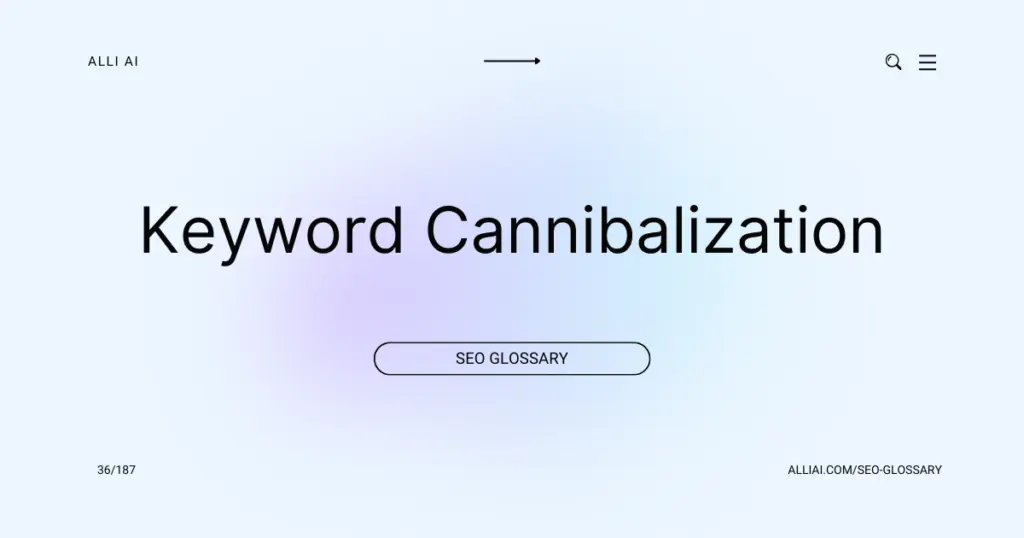What Does Keyword Cannibalization Mean?
Keyword cannibalization occurs when multiple pages on the same website target the same or very similar keywords, which results in these pages competing against each other in search engine results. This can dilute the effectiveness of each page’s SEO, potentially lowering their rankings and reducing their chances of attracting targeted traffic.
Where Does Keyword Cannibalization Fit Into The Broader SEO Landscape?
Keyword cannibalization occurs when multiple pages on a website target the same or similar keywords, essentially competing against each other in search engine rankings. This can dilute the SEO efforts and reduce the overall effectiveness of the website’s search engine optimization strategy.
In the broader SEO landscape, avoiding keyword cannibalization is critical for maintaining a well-structured website that efficiently targets diverse keywords. This helps in maximizing the search visibility for various topics or services offered by the site without undermining page authority or confusing search engines about which page to rank for a given keyword.
Effective keyword management ensures that each page is optimized for unique, specific keywords, enhancing the relevance and authority of each page. This strategy supports a coherent site architecture, improving both user experience (UX) and search engine crawlers’ ability to index and rank pages accurately. Managing keyword distribution can also lead to better content organization, making it easier to create content strategies that fill gaps in keyword coverage and meet user needs comprehensively.
Addressing keyword cannibalization is essential for SEO as it improves individual page performances and boosts overall domain authority, ensuring that all SEO efforts contribute positively towards achieving higher organic search rankings.
Real Life Analogies or Metaphors to Explain Keyword Cannibalization
Keyword Cannibalization is like a soccer team where players are fighting to score with the same ball instead of working together to win against the opponent. This confusion leads to a less effective game strategy, resulting in missed opportunities to score and win.
How the Keyword Cannibalization Functions or is Implemented?
1. Definition Identification: Keyword cannibalization occurs when multiple pages of the same website target the same or similar keywords, causing them to compete against each other in search engine rankings, potentially diluting the efficacy of SEO efforts.
2. Detection:
– Utilize SEO tools to scan the site: Identify pages ranking for the same keywords.
– Analyze Google Search Console: Review performance reports to see which pages appear for similar queries.
– Manual Checks: Search the site on Google using site-specific queries (e.g., site:yourdomain.com “keyword”) to uncover competing pages.
3. Impact Assessment:
– Check rankings: Observe if multiple pages from the same site rank lower for target keywords.
– Analyze traffic: Assess if pages receive less traffic due to split clicks among competing pages.
– Evaluate content quality and relevance: Determine if similar pages cover the same topic without adding unique value.
4. Strategy Development to Resolve Cannibalization:
– Content Merger: Combine similar pages into a single comprehensive resource.
– Internal Linking Adjustments: Redirect the link equity to the most relevant page by adjusting internal links.
– De-optimization: Remove or adjust the keyword focus of less important pages.
– Canonical Tags: Use canonical tags to indicate the preferred page to search engines.
– Deleting or NoIndexing: Remove or de-index redundant or low-quality pages that compete for the same keywords.
5. Implementation and Monitoring:
– Execute the chosen strategy, such as merging pages or changing internal linking structures.
– Monitor changes in search performance and rankings for the affected keywords.
– Adjust based on outcomes (additional merges, further de-optimization, etc.).
6. Preventative Measures:
– Keyword mapping: Assign unique primary keywords to each page to prevent future cannibalization.
– Ongoing keyword research: Stay updated with keyword relevance, trends, and changes to fine-tune content strategy.
– Regular audits: Periodically review the website’s content and keyword assignments to avoid overlaps.
Impact Keyword Cannibalization has on SEO
Keyword cannibalization occurs when multiple pages on a website target the same or very similar keywords, leading to several detrimental effects on SEO performance, rankings, and user experience:
1. Diluted Page Authority: Instead of a single page accumulating all the relevance and authority for a keyword, multiple pages share these signals. This dilution means no single page is as strong or relevant as it could be, weakening the site’s competitive edge for that term.
2. Reduced Click-Through Rates (CTR): Multiple pages appearing for the same search query can confuse users and split click-through rates, reducing the effectiveness of organic search results.
3. Impaired Conversion Rates: Users might land on a less relevant or less optimized page, which could decrease the likelihood of conversion. This misalignment can frustrate users who can’t find the specific information they were seeking.
4. Wasted Crawl Budget: Search engine crawlers spend time accessing and indexing multiple pages that vie for the same keywords, potentially neglecting other important content on the site. This inefficient use of crawl budget can delay the indexing of new content or updates.
5. SEO Efforts and Internal Competition: When multiple pages compete for the same keywords, SEO efforts like link building and content optimization are spread thin across these pages instead of being focused on strengthening a single page’s ranking potential.
6. Confusion in Content Strategy: Keyword cannibalization may indicate overlapping or unclear content strategies, leading to content duplication issues and complicating content management and planning.
7. Lower Rankings: Search engines might struggle to determine which page is most relevant for a given keyword, potentially leading to lower rankings for all competing pages as the search algorithm may not view any single page as particularly authoritative.
Overall, keyword cannibalization can substantially undermine a website’s SEO performance by splitting user attention, diluting signal strengths, and causing inefficiencies in site crawling and indexation.
SEO Best Practices For Keyword Cannibalization
1. Identify Keyword Cannibalization: Use tools like Ahrefs, SEMrush, or Google Search Console to find instances where multiple pages from your site are ranking for the same keywords. Look for keywords where your pages are competing against each other.
2. Analyze the Content and Performance:
– Review each page that is cannibalizing for content quality, relevance, and current search engine rankings.
– Assess metrics such as page views, bounce rate, and conversion rate.
3. Decide on the Most Relevant Page: Choose which page is most relevant or performs best for each keyword. This page will be the primary one you will optimize for the targeted keyword.
4. Merge Content:
– If you have multiple weaker pages, consider merging them into a single comprehensive page.
– Ensure the merged page contains the best attributes and content from the original pages.
5. Redirects:
– Implement 301 redirects from the less relevant pages to the most relevant page.
– Update internal links so they point to the new, primary page.
6. Adjust Internal Linking:
– Strengthen internal links to the primary page using relevant anchor texts from other pages.
– Reduce or remove internal links pointing to the pages being de-emphasized or redirected.
7. Update the Content:
– Enhance the chosen primary page by incorporating additional valuable information from other cannibalizing pages.
– Optimize the content for readability, keyword density, and inclusion of semantic keywords.
8. Re-optimize On-Page Elements:
– Ensure the primary page has optimized title tags, meta descriptions, and headers that focus on the targeted keywords.
– Check that images and other media are properly tagged and optimized.
9. Monitor Performance:
– After implementing changes, closely monitor the search rankings, traffic, and engagement metrics of the updated page.
– Use Google Analytics and Search Console to track improvements or further issues.
10. Adjust Strategy as Needed:
– If the issue persists or the page performance does not improve, reevaluate the content strategy and on-page optimizations.
– Consider further testing with A/B tests to find more effective layout or content styles.
By taking these steps, you can effectively resolve keyword cannibalization issues, helping to improve your site’s SEO performance.
Common Mistakes To Avoid
1. Using Similar Keywords Across Multiple Pages: Avoid targeting the same or very similar keywords on multiple pages of your website. Doing so creates internal competition, diminishing the ability of a single page to rank effectively.
2. Neglecting to Conduct Regular Keyword Audits: Regularly review and analyze the keywords each page is targeting and ranking for. This helps identify instances of cannibalization that might emerge as content grows.
3. Inadequate Keyword Mapping: Clearly map out which pages are targeting which keywords. This strategic planning avoids overlap and ensures that each page serves a unique purpose and targets distinct queries.
4. Ignoring User Intent: Ensure that the content on each page aligns with specific user intents. Different pages should cater to different stages of the buyer’s journey or answer different questions, even if they are closely related.
5. Content Duplication Across Pages: Not only should the keywords be unique, but the content itself should also be unique and tailored to the specific keywords it targets. Repetitive or duplicate content can confuse search engines and dilute ranking potential.
6. Failing to Use Internal Linking Strategically: Use internal linking to signal to search engines which page is most important for a particular keyword. Link from lower-authority pages to higher-authority pages to pass link equity and reinforce the target page’s significance.
7. Over-optimizing for Similar Keywords: Be cautious with keyword density and the overuse of similar keywords across multiple pages, as it can lead to cannibalization. Instead, focus each page on a distinct topic or keyword cluster.
8. Lack of Consolidation for Similar Content: If slight variations of a topic are spread across multiple pages, consider merging these into a single comprehensive page. This can prevent cannibalization and create a stronger, more authoritative page.
9. Ignoring Analytics and Performance Metrics: Monitor your pages’ performance in terms of ranking, traffic, and conversions. A decline may indicate keyword cannibalization, among other issues. Use data to guide content optimization strategies.
10. Overlooking SERP Competitor Analysis: Regularly analyze competitors’ strategies regarding keyword targeting. Understanding how competitors organize and optimize their content can provide insights into avoiding cannibalization and enhancing your own SEO strategy.






